Colin Powell, former secretary of state, dies of COVID-19 complications
He was 84 years old and "fully vaccinated," his family said.
Former secretary of state and chairman of the Joint Chiefs of Staff, Colin Powell, died Monday morning due to complications from COVID-19, his family said in a statement.
"He was fully vaccinated. We want to thank the medical staff at Walter Reed National Medical Center for their caring treatment," the family said. "We have lost a remarkable and loving husband, father, grandfather and a great American."
Powell was 84 years old.
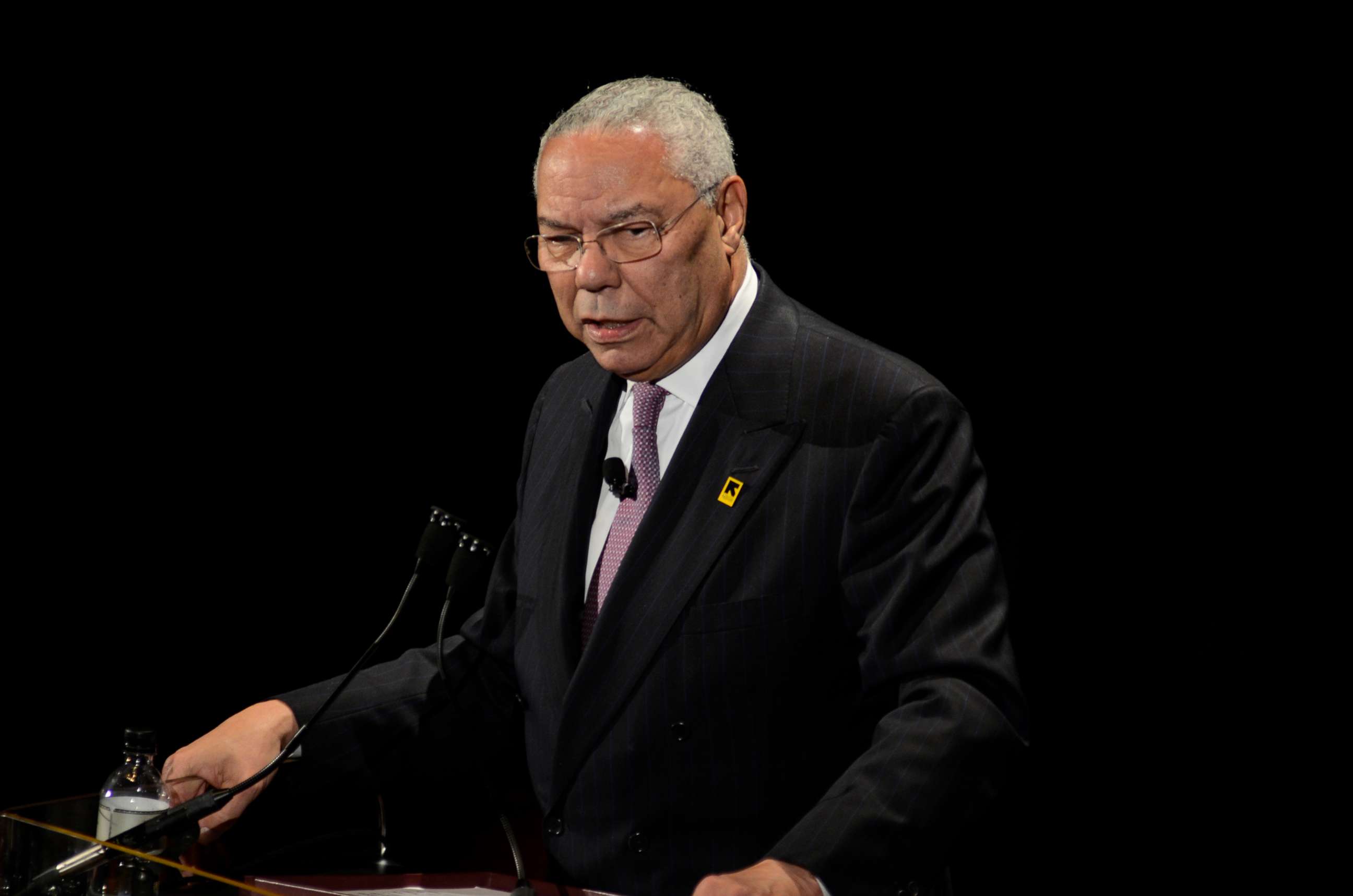
Peggy Cifrino, Colin Powell's longtime spokesperson, confirmed to ABC News that Powell was successfully being treated for a few years for multiple myeloma, a cancer of blood cells, that compromises the immune system. She also confirmed that Powell was scheduled to soon receive his third COVID booster shot and that he had been diagnosed with Parkinson's disease.
Powell served under four presidents -- Ronald Reagan, George Bush, Bill Clinton and George W. Bush -- at the very top of the national security establishment, first as deputy national security adviser and then as national security adviser. Finally, he was appointed chairman of the Joint Chiefs of Staff, the senior ranking member of the U.S. armed forces and top military adviser to the president.
He was the first African American ever to hold that post and the first Black secretary of state.
During his many decades in public life, time he helped shape American defense and foreign policy. He was in top posts during the fall of the Berlin Wall, the collapse of the Soviet Union, the downsizing of the military after the end of the Cold War, the 1989 invasion of Panama, the 1991 Gulf War, the 1992-93 engagement in Somalia and crisis in Bosnia, and the Sept. 11 attacks and U.S. invasion of Iraq and Afghanistan.
"Laura and I are deeply saddened by the death of Colin Powell," Bush said in a statement. "He was a great public servant, starting with his time as a soldier during Vietnam. Many Presidents relied on General Powell's counsel and experience. He was National Security Adviser under President Reagan, Chairman of the Joint Chiefs of Staff under my father and President Clinton, and Secretary of State during my Administration. He was such a favorite of Presidents that he earned the Presidential Medal of Freedom – twice. He was highly respected at home and abroad. And most important, Colin was a family man and a friend. Laura and I send Alma and their children our sincere condolences as they remember the life of a great man."
President Joe Biden also extolled Powell as "a patriot of unmatched honor and dignity" and noted their long-standing relationship dating back to Biden's time in the Senate.
"Colin embodied the highest ideals of both warrior and diplomat," Biden said in a statement. "Colin led with his personal commitment to the democratic values that make our country strong. Time and again, he put country before self, before party, before all else—in uniform and out—and it earned him the universal respect of the American people."
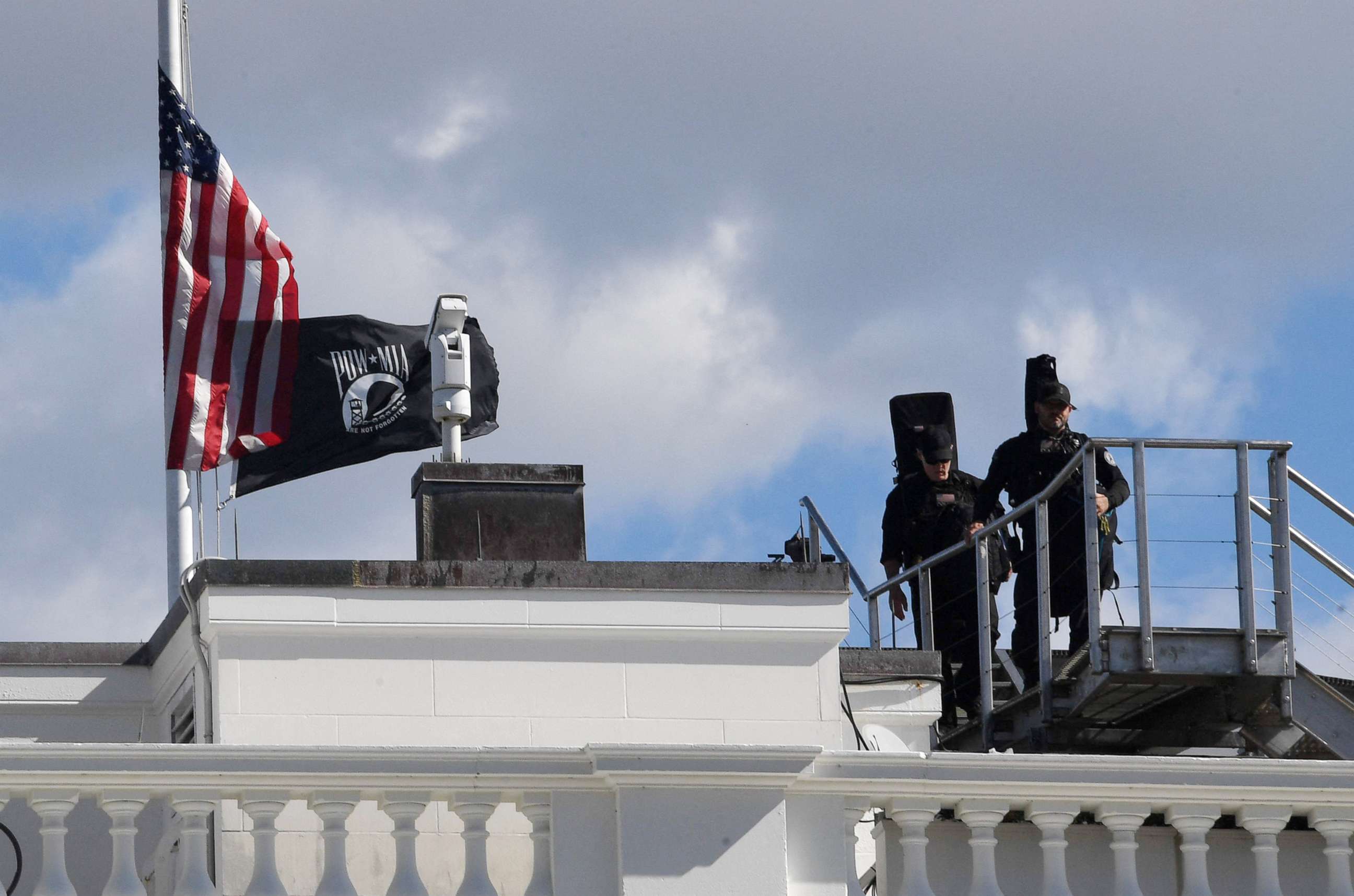
"Above all, Colin was my friend. Easy to share a laugh with. A trusted confidant in good and hard times. He could drive his Corvette Stingray like nobody's business -- something I learned firsthand on the racetrack when I was Vice President," he wrote.
Secretary of Defense Lloyd Austin, the first African American to head the Pentagon, reacting to the news, said he feels "as if I have a hole in my heart."
"The world lost one of the greatest leaders that we have ever witnessed," Austin told reporters on a trip to the nation of Georgia. "And I lost a tremendous personal friend and mentor."
Powell as soldier, statesman
During his military career, Powell received at least 11 military decorations including the Purple Heart and the Bronze Star for his actions in the Vietnam War. During his second tour of Vietnam in 1968, Powell was one of the victims of a helicopter crash that left him and several of his comrades injured. He was still able to rescue his fellow serviceman from the burning helicopter and was awarded the Soldier's Medal for his actions.
For the next two decades, Powell moved back and forth between the military and the heart of government in Washington.
After a tour of duty in Korea as a battalion commander in 1973, Powell served in former President Richard Nixon's administration as a recipient of a prestigious White House fellowship, where was assigned to the Office of Management and Budget. Following this fellowship, Powell served as a staffer in the Pentagon.
The media spotlight first found the four-star Army general during the 1991 Gulf War, when, as head of the Joint Chiefs of Staff, he appeared on television screens across the world. With his steady gaze, he conveyed intelligence, certainty and straightforwardness.
After the allied coalition expelled the Iraqi army from Kuwait, Powell's celebrity grew, and his name became synonymous with integrity for many Americans across the political spectrum.
Powell retired from the Army after the Gulf War, and his supporters urged him to run for president, touting him as the only candidate with the moral stature needed to unite the country and heal longstanding racial wounds. Powell twice said he wasn't interested in running for president, but left open the possibility of an appointed position such as secretary of state.
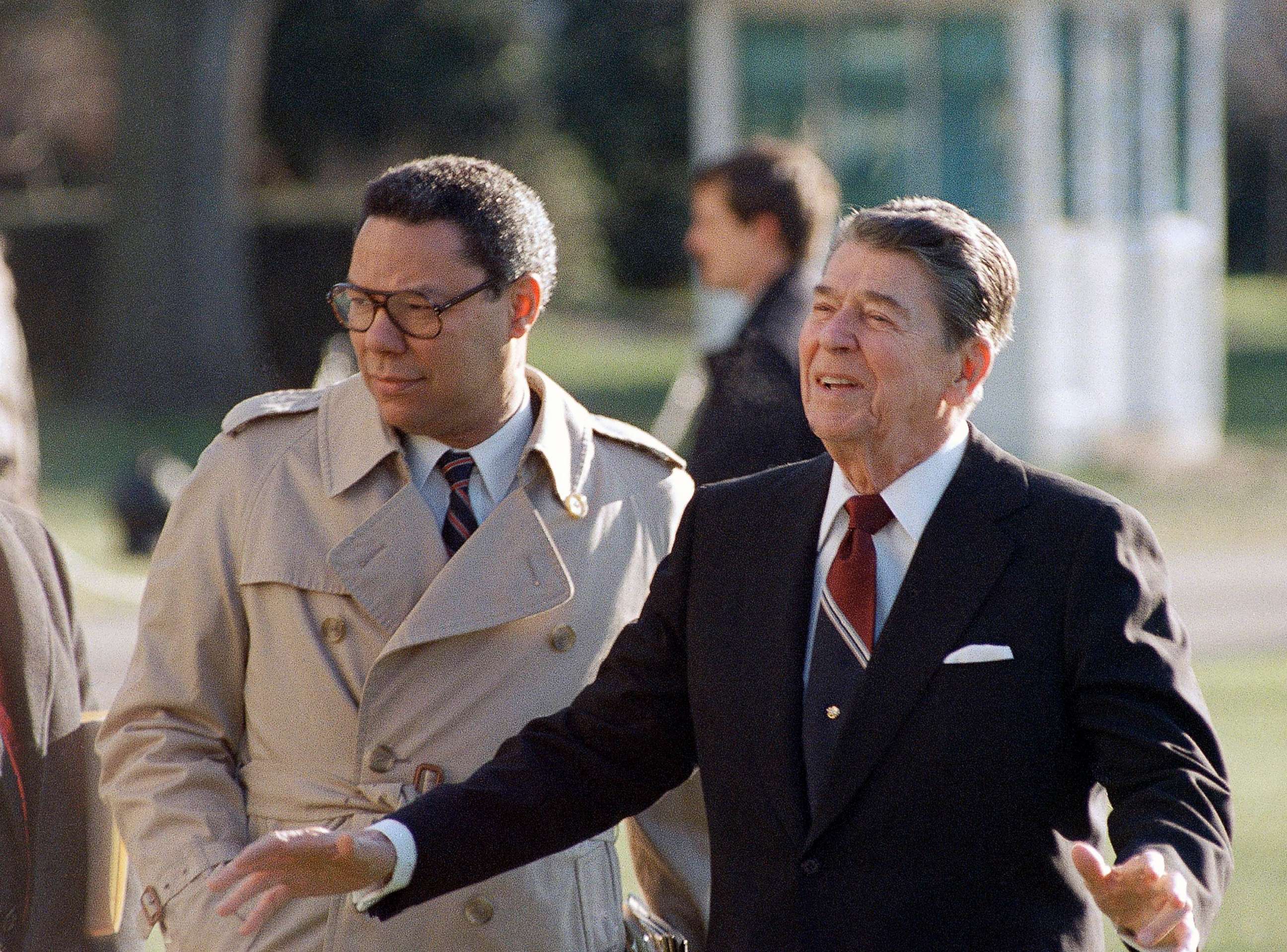
From 1994 to 2000, Powell was engaged in several notable humanitarian and personal efforts. In 1994, he, former President Jimmy Carter and former Sen. Sam Nunn, D-Ga., embarked on a peacekeeping mission in Haiti, in which they were able to help bring to an end to military rule and establish an elected government for the country.
In 1995, Powell published his autobiography, "My American Journey," in which he touched on everything from his military experiences to more personal matters. Powell was also a co-chair for America's Promise, a non-profit organization geared toward empowering young people, for which he served as chairman from 1997-2000.
The Powell doctrine
At the 2000 Republican National Convention, Powell won standing ovations and helped Bush in his efforts to put a "new face" on the Republican Party and reach out to African Americans, who traditionally favored the Democratic Party.
Powell was sworn in as the 65th secretary of state on Jan. 20, 2001, and would soon play a pivotal role in another conflict. In the aftermath of the Sept. 11 attacks on the homeland, Powell worked to build an international coalition and used his long military experience to help design a strategy for the war on terrorism. He tried to prepare the country for a different type of war, one where the enemy might be hard to identify.
"I was raised a soldier, and you are trained, there is the enemy occupying a piece of ground. We can define that in time, space and other dimensions, and you can assemble forces and go after it," Powell said at the time. "This is different. The enemy is in many places. The enemy is not looking to be found. The enemy is hidden. The enemy is very often right here within our own country. And so you have to design a campaign plan that goes after that kind of enemy."
It was Powell who told the United Nations and the world that Saddam Hussein had weapons of mass destruction and posed an imminent threat, assertions that later proved to be false. He told ABC News' Barbara Walters in Sept. 2005 that he feels "terrible" about the claims he made in that now-infamous address arguing for the U.S. invasion of Iraq.
When asked if he feels it has tarnished his reputation, he said, "Of course it will. It's a blot. I'm the one who presented it on behalf of the United States to the world, and [it] will always be a part of my record. It was painful. It's painful now."
"George Tenet (then CIA director) did not sit there for five days with me misleading me. He believed what he was giving to me was accurate," he said. "The intelligence system did not work well."
"There were some people in the intelligence community who knew at that time that some of these sources were not good, and shouldn't be relied upon, and they didn't speak up. That devastated me," he added.
While Powell ultimately supported the president's decision to invade Iraq, he acknowledged that he was hesitant about waging war.
"I'm always a reluctant warrior. And I don't resent the term, I admire the term, but when the president decided that it was not tolerable for this regime to remain in violation of all these U.N. resolutions, I'm right there with him with the use of force," he said.
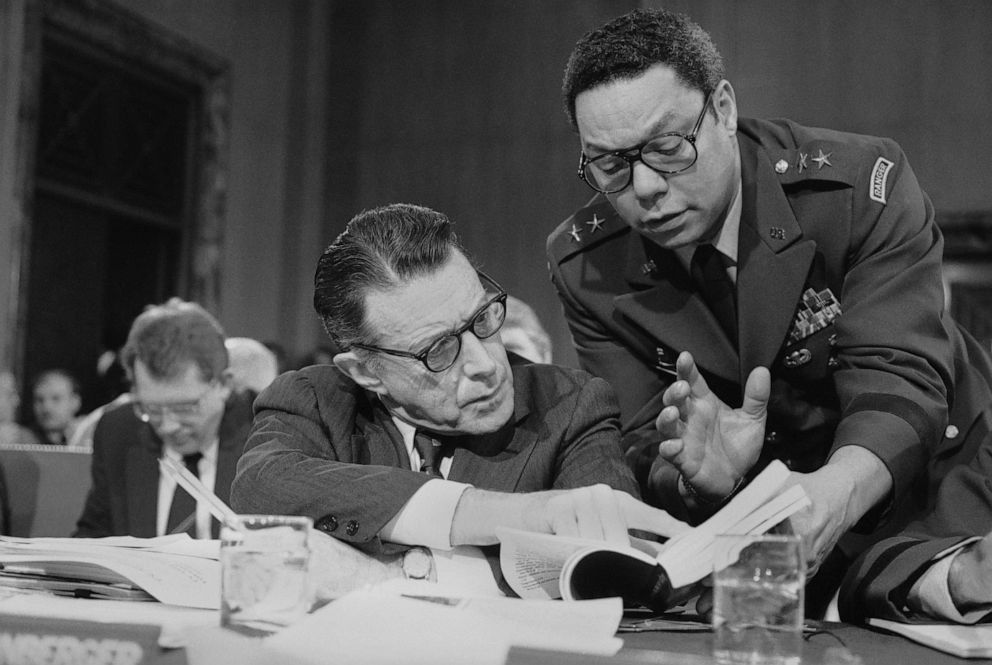
Casper Weinberger, secretary of defense for seven years under Reagan and Powell's former boss, said the position of secretary of state was "perfect" for Powell.
It was under Weinberger's tutelage that Powell honed the "Powell doctrine" -- that a country should avoid intervening in international conflicts unless there is a vital interest and a clear, achievable goal.
The doctrine was inspired by lessons learned from U.S. involvement in Vietnam and principles Powell took to heart from a military philosophy book, "On War," published in 1830. He first read it as a student at the National War College in the early 1970s.
Secretary of State Antony Blinken called Powell's career "legendary."
"By the time he retired from military, he was arguably the most respected and celebrated American in uniform," Blinken said in remarks from the State Department on Monday.
"I believe Secretary Powell's years as a soldier are what made him such an exceptional diplomat. He knew that war and military action should always be a last resort, and to make that so, we need our diplomacy to be as robust and well resourced as possible," he said.
The Powell legacy
Throughout his service in the military, Powell never made his political leanings known. Although he served under both Democratic and Republican administrations, it wasn't until 1995 that Powell announced that he had registered as a Republican. He formally supported the candidacy of Democratic presidential candidates Lyndon Johnson, Barack Obama, Hillary Clinton and Joe Biden.
The reelection campaign of former President Donald Trump brought out Powell's political side in the last years of his life, when he called on voters not to support the incumbent, Republican president.
"I think he has not been an effective president," Powell told CNN's Jake Tapper in June 2020. "He lies all the time. He began lying the day of inauguration, when we got into an argument about the size of the crowd that was there. People are writing books about this favorite thing of lying. And I don't think that's in our interest."
"The values I learned growing up in the South Bronx and serving in uniform were the same values that Joe Biden's parents instilled in him in Scranton, Pennsylvania," Powell said in a video message at the 2020 Democratic National Convention. "I support Joe Biden for the presidency of the United States because those values still define him, and we need to restore those values to the White House."
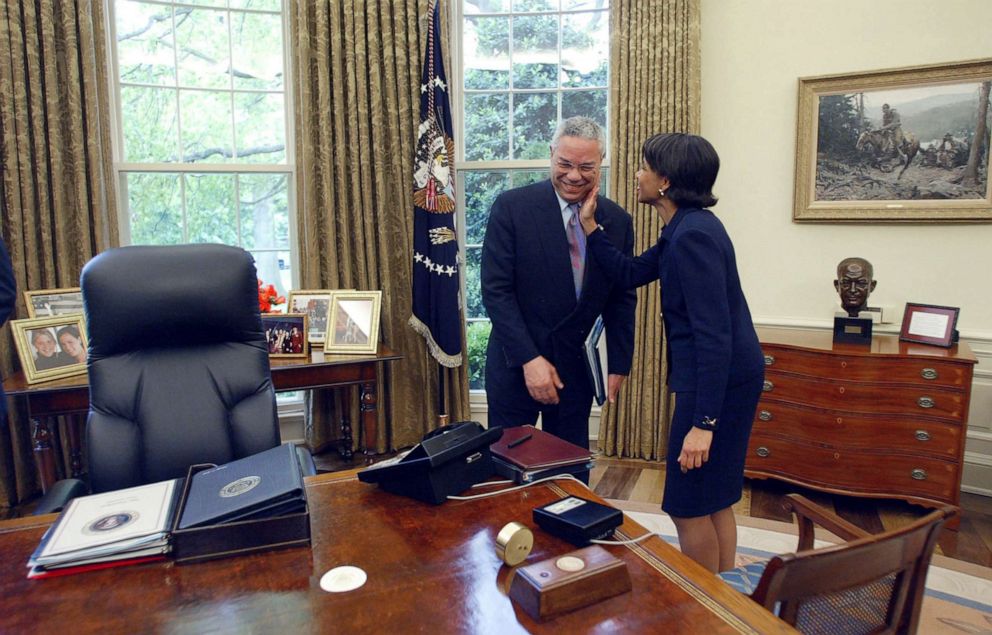
After the Jan. 6 attack on the Capitol, Powell told CNN he "can no longer call myself a fellow Republican" and that "we need people who will speak the truth."
In many ways, Powell, the son of Jamaican immigrants, was the embodiment of the American Dream.
Raised amid the poverty of the South Bronx, he went to public schools, including the City College of New York. It was while attending City College that Powell joined the Reserve Officers Training Corps and discovered his passion for a military career. He once said he "found himself" while studying there. He rose to the top of his ROTC class, and when he graduated he earned the title of cadet colonel, the highest-ranking position in the corps.
In a statement on Powell's passing, Obama harkened back to a 2008 interview in which he defended the Democratic nominee from swirling conspiracy theories and offered a teaching moment in what it means to be an American.
"'The correct answer is, he is not a Muslim; he's a Christian," General Powell said. "But the really right answer is, 'What if he is?' Is there something wrong with being a Muslim in this country? The answer's no, that's not America. Is there something wrong with some seven-year-old Muslim-American kid believing that he or she could be president?'"
"He never denied the role that race played in his own life and in our society more broadly," Obama wrote. "But he also refused to accept that race would limit his dreams, and through his steady and principled leadership, helped pave the way for so many who would follow."
Powell spent his entire adult life in service to his country. He leaves behind his wife, Alma Powell, and his three children, Michael, Linda and Annemarie.
On Monday night, Peggy Cifrino, the spokesperson for Powell, confirmed to ABC News in a statement that Alma Powell also tested positive for COVID-19 and is now home after having been treated at Walter Reed.
"Mrs. Powell tested positive for COVID too. Her symptoms were mild. She went to Walter Reed with the General. She was treated and went home. She was not admitted. She feels fine and is recovering. She had both of the Moderna vaccinations," Cifrino said.
ABC News' Luis Martinez, Conor Finnegan and Libby Cathey contributed to this report.




